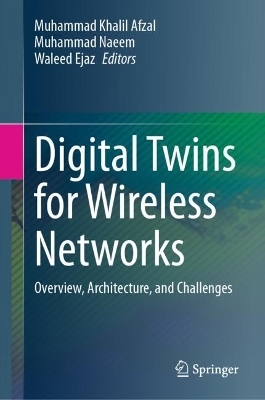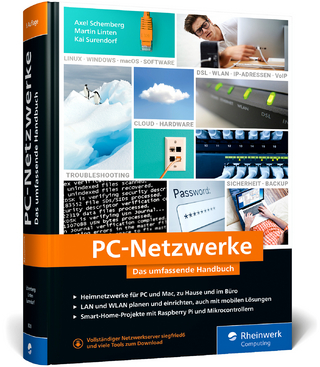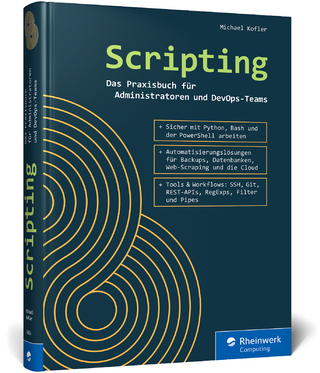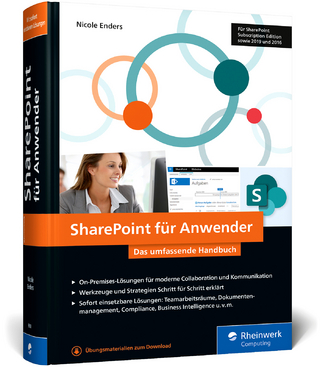
Digital Twins for Wireless Networks
Springer International Publishing (Verlag)
978-3-031-73678-0 (ISBN)
- Noch nicht erschienen - erscheint am 16.01.2025
- Versandkostenfrei innerhalb Deutschlands
- Auch auf Rechnung
- Verfügbarkeit in der Filiale vor Ort prüfen
- Artikel merken
The sixth-generation (6G) communication systems are anticipated to provide network connectivity for an extensive range of use cases in a variety of emerging vertical industries. Consequently, a new set of challenging requirements and more stringent key performance indicators have to be considered, a novel architecture has to be designed, and unique enabling technologies shall be developed in order to fulfil the technical, regulatory, and business demands of the communication service customers.
6G networks are expected to offer even faster speeds, lower latency, and greater capacity compared to 5G networks, which will enable new applications and use cases that are currently not possible. Improved quality of life by enabling various applications (emerging Internet of everything applications) such as healthcare, brain-computer interactions, and extended reality is the main focus of future wireless services. Quality of experience, latency, and reliability are the key requirements of these applications. To meet these diverse requirements there is a need to assist wireless systems with unique technologies. Self-sustaining wireless systems (intelligence, seamless and ubiquitous connectivity) and proactive-online-learning-enables systems (Intelligent analytics) are two trends in future wireless systems. The digital twin technology is one of the most promising technologies that can be instrumental in realizing the technical and business objectives of 6G communication systems.
A digital twin is a virtual imitation of a physical object or system. In a wireless system, a digital twin can be used to model and analyse the behaviour of the network and its components, such as antennas, transmitters, receivers, sensors, and other devices in wireless networks. One of the key benefits of using a digital twin for a wireless system is that it can help network operators and engineers to optimize the performance of the wireless network by simulating different scenarios and configurations. Other benefits include improve efficiency, cost saving, and enhanced security. In 6G networks, a digital twin could be used to simulate and optimize the performance. This could include simulating different network topologies, testing the performance of different network protocols and algorithms, and optimizing the placement of network infrastructure.
To create a digital twin of a wireless network, a detailed model of the network and its components must be developed, based on real-world data and conditions. This model can then be used to simulate the behaviour of the network under different conditions and settings and to visualize the results in real time.
Muhammad Khalil Afzal (SM'16) received his MCS and M.S degrees in Computer Science from COMSATS Institute of Information Technology, Wah Campus, Pakistan in 2004 and 2007, respectively, and his Ph.D. Degree from the Department of Information and Communication Engineering, Yeungnam University, South Korea, in December 2014. He served as a lecturer from January 2008 to November 2009 at Bahauddin Zakariya University Multan Pakistan, and from December 2009 to June 2011 at King Khalid University Abha, Saudi Arabia. Currently, he is working as an Associate Professor (Tenured) in the Department of Computer Science at COMSATS, Wah Cantt Pakistan. He has served as a Guest Editor of IEEE Internet of Things Journal, Elsevier Computer Communication, IEEE Communication Magazine, Transactions for Emerging Telecommunications Technologies (ETT), Future Generation Computer Systems (Elsevier), IEEE ACCESS, Journal of Ambient Intelligence and Humanized Computing (Springer), MDPI Sensors Journal and reviewer for IEEE ACCESS, Computers and Electrical Engineering (Elsevier), Journal of Network and Computer Applications (Elsevier), FGCS, and IEEE transaction on Vehicular Technology. He is the recipient of the best paper awards of ACM 7th International Conference on Computing Communication and Networking Technologies and in International Conference on Green and Human Information Technology (ICGHIT-2018) and a fully funded scholarship for a Master and Ph.D. He is the recipient of research projects funded by the Higher Education Commission (HEC), Pakistan, the National Grassroots ICT Re-search Initiative, Ignite, Pakistan, the European Union's Programme Horizon 2020, and the British Council UK. His research interest includes wireless sensor networks, ad hoc networks, Data-driven intelligence in wireless networks, Smart Cities, 5G, and IoT.
Muhammad Naeem received the B.S. and M.S. degrees in electrical engineering from the University of Engineering and Technology, Taxi-la, Pakistan, in 2000 and 2005, respectively, and the Ph.D. degree from Simon Fraser University, Burnaby, BC, Canada, in 2011. From 2000 to 2005, he was a Senior Design Engineer with Comcept (Pvt) Ltd., Islamabad, Pakistan, where he participated in the design and development of smart card-based GSM and CDMA pay phones with the Department of Design. From 2012 to 2013, he was a Postdoctoral Research Associate with the Wireless Networks and Communications Research (WINCORE) Laboratory, at Ryerson University, Toronto, ON, Canada. Currently, he is a Professor with the Department of Electrical Engineering, COMSATS University Islamabad, Wah Campus, Wah, Pakistan. He is also a Microsoft Certified Solution Developer. His research interests include the optimization of wireless communication systems, non-convex optimization, re-source allocation in cognitive radio networks, and approximation algorithms for mixed integer programming in communication systems. He was a recipient of the NSERC CGS Scholarship.
Waleed Ejaz (S'12-M'14-SM'16) is an Associate Professor in the Department of Electrical Engineering at Lakehead University, Barrie Campus, ON, Canada. He was an Assistant Professor in the Department of Engineering & Applied Science at Thompson Rivers University, Kamloops, BC, Canada from Sep. 2018 to Aug. 2020. Previously, he held academic and research positions at Ryerson University, Carleton University, and Queen's University in Canada. He received the B.Sc. and M.Sc. degrees in Computer Engineering from the University of Engineering and Technology, Taxila, Pakistan, and the National University of Sciences and Technology, Islamabad, Pakistan, and a Ph.D. degree in Information and Communication Engineering from Sejong University, Republic of Korea, in 2014. He has co-authored over 90 papers in prestigious journals and conferences and 3 books. His current research interests include the Internet of Things (IoT), energy harvesting, 5G and beyond networks, and mobile edge compu
Chapter 1 Overview of Digital Twin, Architecture, and Applications.- Chapter 2 Dielectric and Path Loss Modeling to Support Simple and Fast Digital Twins for Wireless Human Body Area Network.- Chapter 3 ML for Digital Twin over Wireless Networks: Creation, Deployment, and Applications.- Chapter 4 Optimal Offloading in Digital Twin-assisted Multi-Stage Networks.- Chapter 5 Employing Federated Learning for the Implication of Digital Twin.- Chapter 6 Security Attacks in Digital Twin-Enabled Wireless System.- Chapter 7 Metaverse Enabled UAV in Disaster Scenario.- Chapter 8 Digital Twin for UAVs: Architecture, Framework, Challenges and Solutions.
| Erscheint lt. Verlag | 16.1.2025 |
|---|---|
| Zusatzinfo | XIX, 159 p. 42 illus., 41 illus. in color. |
| Verlagsort | Cham |
| Sprache | englisch |
| Maße | 155 x 235 mm |
| Themenwelt | Mathematik / Informatik ► Informatik ► Netzwerke |
| Technik ► Nachrichtentechnik | |
| Schlagworte | AI for digital twins • Digital twin challenges • Digital Twins • Digital twins and machine learning • Digital twins for 6G • Digital twins for smart cities • Digital twins for smart grid • Digital twins for wireless networks • Federated learning for digital twins • Framework for digital twins |
| ISBN-10 | 3-031-73678-8 / 3031736788 |
| ISBN-13 | 978-3-031-73678-0 / 9783031736780 |
| Zustand | Neuware |
| Haben Sie eine Frage zum Produkt? |
aus dem Bereich


